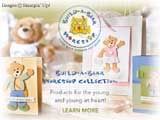The words on this card are taken from a very old and famous Christmas carol, God Rest Ye Merry Gentlemen. Wikipedia tells us "It is referred to in Charles Dickens' A Christmas Carol, 1843: "...at the first sound of — "God bless you merry, gentlemen! May nothing you dismay!"— Scrooge seized the ruler with such energy of action, that the singer fled in terror, leaving the keyhole to the fog and even more congenial frost."
So on this card, we have words from one of my favorite carols in one of my all-time favorite stories by one of my favorite authors. That is a lot of personal favorites, all wrapped up in just a few words! But those few words capture the magic of Christmas and why it is such a festive and joyful celebration. God sent His son, the Lord Jesus Christ, to save sinners, to reconcile fallen mankind to Himself, to bring people back into relationship with Him. From the beginning of the coming of Christ, there were "tidings of comfort and joy" being expressed by angels and then told by shepherds and wise men and common folk and important folk. The message was for all who had an ear to hear. And it is still the same today. The message is for all who have an ear to hear. Tidings of comfort and joy, not of hostility and judgment, not of anger and separation. It is well stated in the 3rd verse of God Rest Ye Merry Gentlemen (there are 7 verses!):
"Fear not, then," said the angel, "Let nothing you afright
This day is born a Savior of a pure Virgin bright,
To free all those who trust in Him from Satan's power and might."
This day is born a Savior of a pure Virgin bright,
To free all those who trust in Him from Satan's power and might."
O tidings of comfort and joy, comfort and joy;
O tidings of comfort and joy.
O tidings of comfort and joy.
Now, I'm going to give you a little history lesson because I love the history of the carols and I enjoy sharing what I love! So if you wish to know a bit more about God Rest Ye Merry Gentlemen, read on!
Like most of the earliest Christmas songs, this was written as direct reaction to the music of the church. During this period the songs of the church were usually written in Latin and put to melodies that were somber and dark. This type of music offered singers and listeners little joy and happiness. So while the people continued to go to organized worship services, they created their own church music outside the walls of the cathedrals and chapels that were light, lively and penned in common language. Their Christmas folk songs became the foundation of what are now knows as Christmas carols.
"God Rest Ye Merry Gentlemen" was sung for hundreds of years before finally being published in the 1800s. Queen Victoria America
The problem is that few of today’s singers fully understand the beginning of the carol. This is because language is dynamic and words change over time. Today, when people say Merry Christmas, they mean “happy.” Five hundred years ago, when "God Rest Ye Merry Gentlemen" was written, “merry” had a very different meaning.
Today we hear of Robin Hood’s "Merry Men." Now, they may have been happy, but in the time of Robin Hood the word “merry” that described them meant “great and mighty.” Thus, in the middle ages a strong army was a merry army, a great singer was a merry singer, and a mighty ruler was a merry ruler.
So when the English carolers of the Victorian era sang, "merry gentlemen," they meant great or mighty men. Even when translated to "God rest you mighty gentlemen," the song still makes very little sense.
This is due to another word that has a much different meaning in today’s world and a punctuation mark that has been lost. The word "rest" in "God Rest Ye Merry Gentlemen" simply means “keep or make.” Yet to completely uncover the final key understanding the meaning, a comma needs to placed after the word “merry.” Therefore, in modern English, the first line of "God Rest Ye Merry Gentlemen" should read "God make you mighty, gentlemen." Using this translation the old carol suddenly makes perfect sense, as does the most common saying of the holidays, "Merry Christmas." You just have to know how to translate the words into the language of the day to have a very Mighty Christmas!
from the online source, The Fellowship.
God rest ye merry, gentlemen, let nothing you dismay,
Remember Christ our Savior was born on Christmas Day;
To save us all from Satan's power when we were gone astray.
O tidings of comfort and joy, comfort and joy;
O tidings of comfort and joy.
O tidings of comfort and joy.





















No comments:
Post a Comment